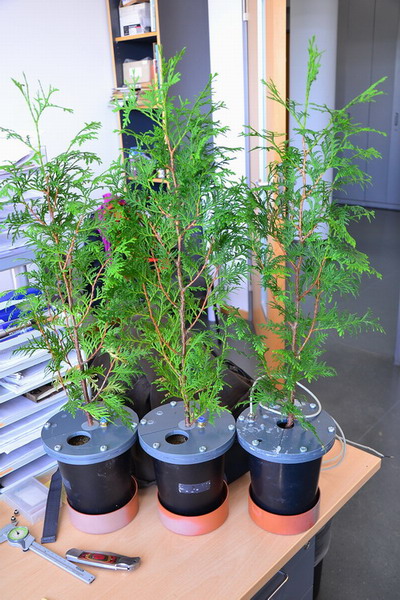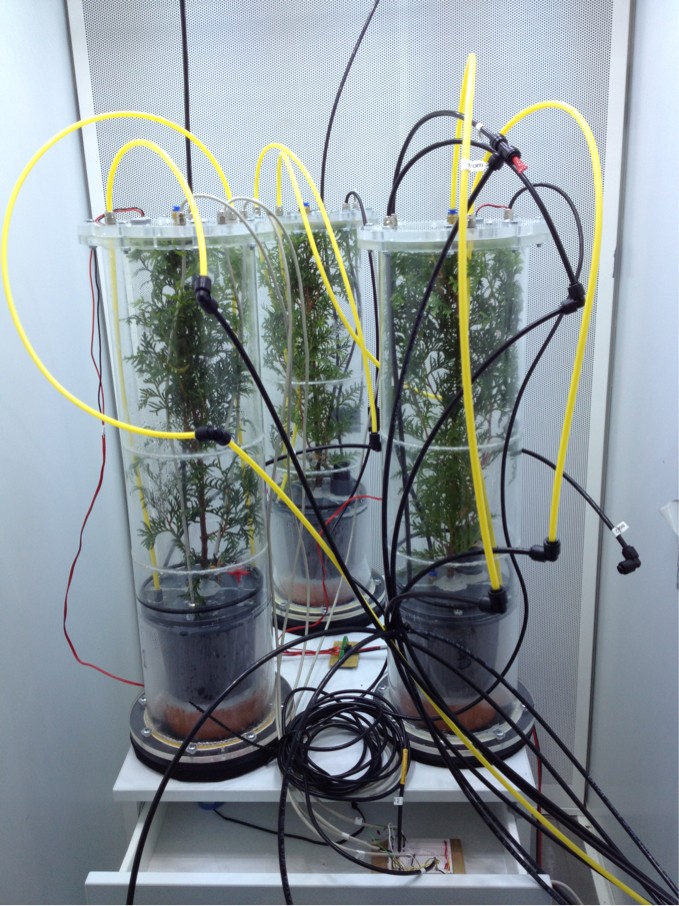Environmental stresses can alter both photosynthetic and respiratory rates and therefore affect the plant carbon (C) budget in the short term. The point of zero net C assimilation for the whole plant (i.e. when photosynthetic C uptake equals respiratory C loss on a 24 h basis) is a useful concept to investigate the whole-plant C balance under environmental stresses, and is defined here as the whole-plant C compensation point (CCP). The combined effects of elevated temperature and drought on the whole-plant CCP have not been assessed.
In cooperation with scientists from Max Planck Institute for Biogeochemistry, Mr. ZHAO Junbin and his teacher Prof. ZHANG Yiping of Xishuangbanna Tropical Botanical Garden (XTBG) carried out a water stress experiment on Thuja occidentalis L., a drought-tolerant evergreen coniferous species in the Cupressaceae family, at three different temperatures (15, 25 and 35°C), and focused on tracking variations of the components (i.e. photosynthesis and respiration) of whole-plant daily C balance as soil moisture declined. They exposed Thuja occidentalis to progressive drought under three temperature conditions (15, 25 and 35°C), and measured carbon and water fluxes using a whole-tree chamber design.
The researchers hypothesized that trees would be forced into a negative C balance at higher soil moisture content when grown under high temperature (> 30°C) because of higher respiratory demand combined with reduced photosynthesis driven by earlier stomatal closure. At lower temperatures, trees should survive longer and reach the CCP at lower soil moisture contents.
The study revealed that changes in whole-plant C balance during drought stress were highly temperature-dependent. As hypothesized, C deficit occurred in trees at a high temperature (35°C) at a soil moisture content that may not be considered as drought for trees growing at a lower temperature (15°C). Their results suggested that high temperatures can increase the risk of C starvation by forcing trees to be C-deficient under relatively high soil moisture contents. Plants experiencing higher temperatures accumulated less C and were more likely to become C-limited under the same soil moisture conditions.
The study demonstrated that high temperature shifted the carbon compensation point of plants to higher soil moisture values. The researchers concluded that a warming climate may cause physiological drought (i.e. C deficit) even when no meteorological or severe drought occurs, and may consequently threaten the survival of plants in more regions. Similarly, summer drought may impose a greater threat to plants than droughts during colder periods.
The study entitled “High temperature causes negative whole-plant carbon balance under mild drought” has been published online in New Phytologist, a prestigious journal ranking 6 among the 195 journals in plant sciences in the Journal Citation Reports (JCR).
Thuja occidentalis L
Chambers (Images by Zhao Junbin)
|


